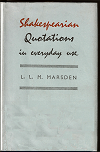

| Book of the Month | ||
 |
Shakespearian Quotations in Everyday Use |  |
Publisher: Witherby Ltd
Author: L. Marsden
$10.99
ISBN -
There's a story that an old lady went to see a Shakespeare play. Afterwards she remarked to a friend 'I don't see why everyone thinks Shakespeare is so good. The play was full of cliches'. It tells us something about the powerful effect that Shakespeare has had on the English language that many people quote him every day without even realizing that they have done so. Sometimes Shakespeare simply said it so well that no-one has been able to do better, so we still use his words. Every time we call someone 'a blinking idiot', or refer to something that is 'last but not least' or call something ugly an 'eye-sore' we are quoting Shakespeare. Sometimes people will quote Shakespeare jokingly, referring to their youth as their 'salad days', or do so because the quote says exactly what they want to say 'There's no way to tell the mind's complexion from the face. He may smile and smile, yet still be a villian.' (One of my favourites.) Because there is so much Shakespeare in English, a little book like this will never go out of fashion, which explains why it has been so often reprinted over the past century.
What the author of this book has done is go through Shakespeare's plays and locate the phrases which occur most often in everyday English. So the book is in three sections - Shakespeare's comedies, tragedies and histories. Each play in these sections gives us two to three pages of quotes. What is surprising is that even less well-known plays often contain well-known quotes. For example the proverb 'if you dine with the devil, take a long spoon' comes originally from 'A Comedy of Errors'. It is one of several quotes from Shakespeare that has changed slightly in the course of becoming a proverb. For another example (from Henry VI) the phrase 'smooth runs the water where the brook is deep' has become today's 'still waters run deep'.
Surprisingly the book omits some of the more common phrases - for example the always misused 'Wherefore art thou Romeo?' is often used as a humourous way of asking where someone is. However 'wherefore' in Shakespeare's day meant 'why'. (And still does in the modern expression 'whys and wherefore'.) But many old favourites - 'My kingdom for a horse', 'a plague on both your houses', 'tis better to have loved and lost ...' are there, listed by play and scene. If you want to look them up, the quotes are numbered and listed in a very comprehensive index that takes up over thirty pages of this short (156 page) book. There are no illustrations, though some of the quotes would go very with with a picture. Also the meaning of some of the quotes is not explained. For example Hamlet's famous rejection of Ophelia 'Get thee to a nunnery!' is all the more hurtful when one realizes that in Shakespeare's time a 'nunnery' was slang for a brothel.
Who is this book for? If you have read a lot of English,you will be surprised and pleased to find expressions which you had no idea come from Shakespeare. This makes the book a handy little guide to dip into during an idle moment - after all, it never hurts to brush up your Shakespeare. A native speaker can always find a useful expression, and a teacher something apt with which to surprise a class. And nothing astonishes an Englishman more than having Shakespeare quoted at him by a foreigner, so language students looking for a bit of fun might do well to memorize a few quotes. However, a quick search for 'Shakespeare quotes' on the internet will also produce a huge range, so if you cannot find this handy little book, alternatives are plentiful.
Verdict: Stops you from being 'tongue-tied' (Henry VI again)
Assessment 7/10